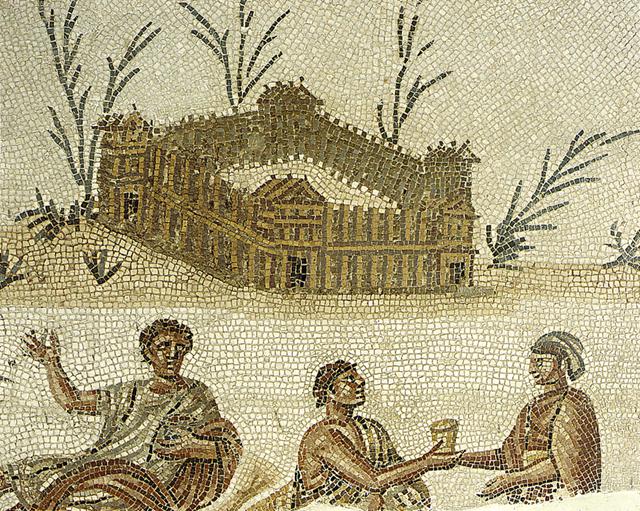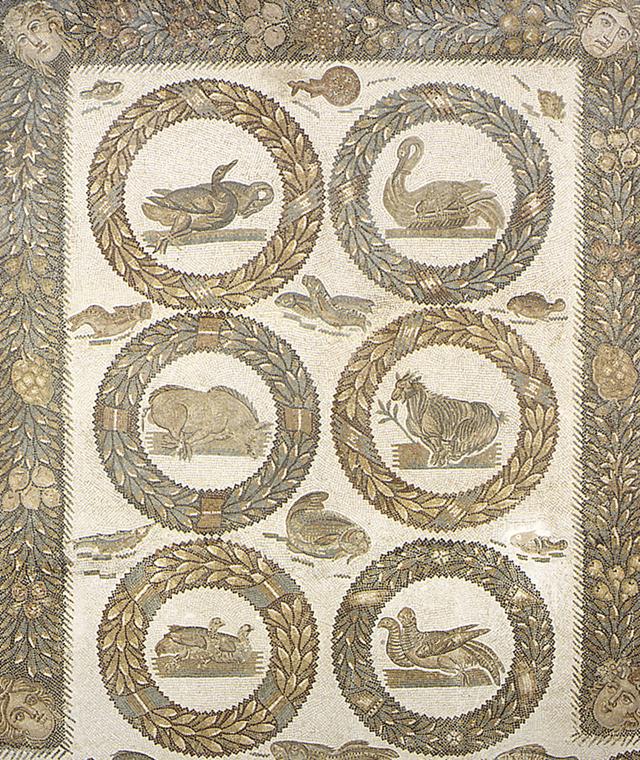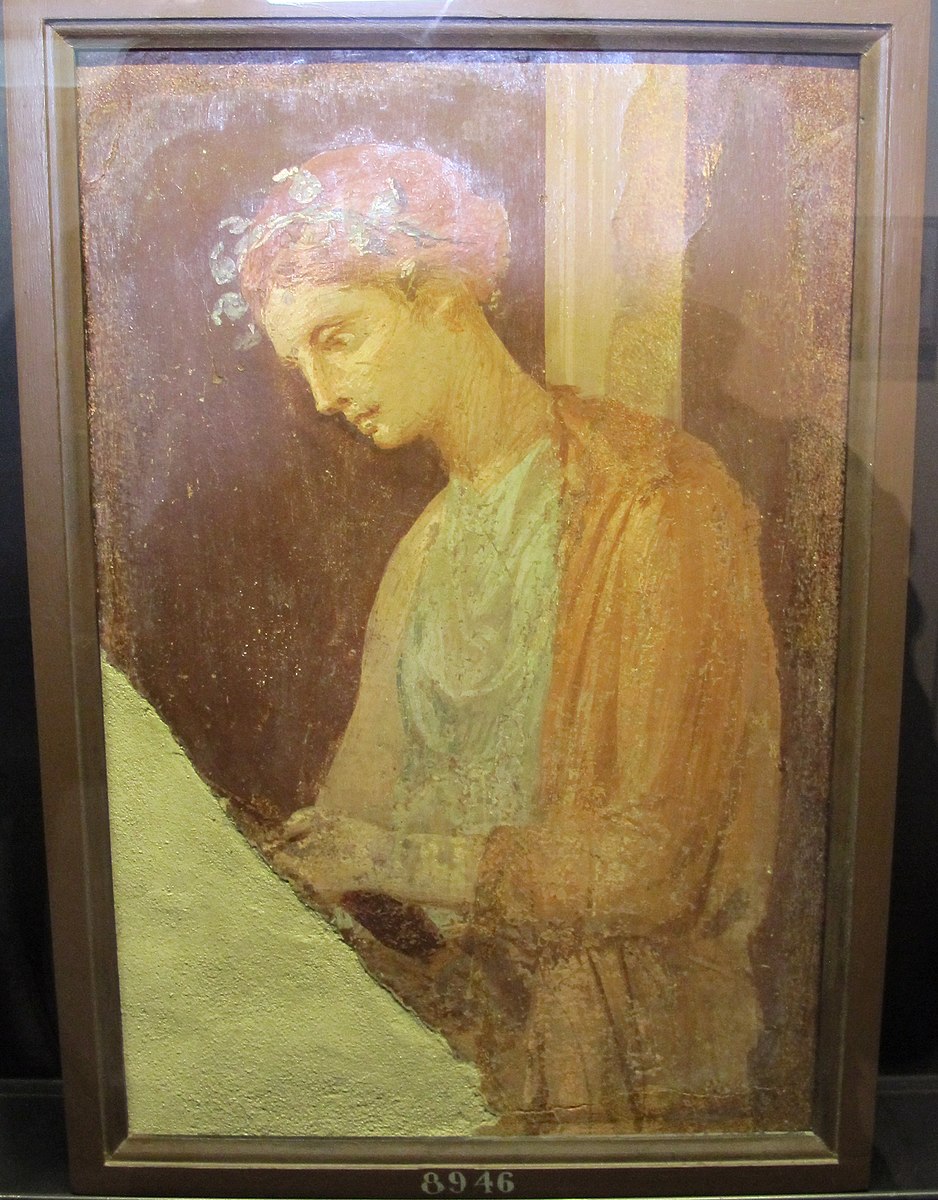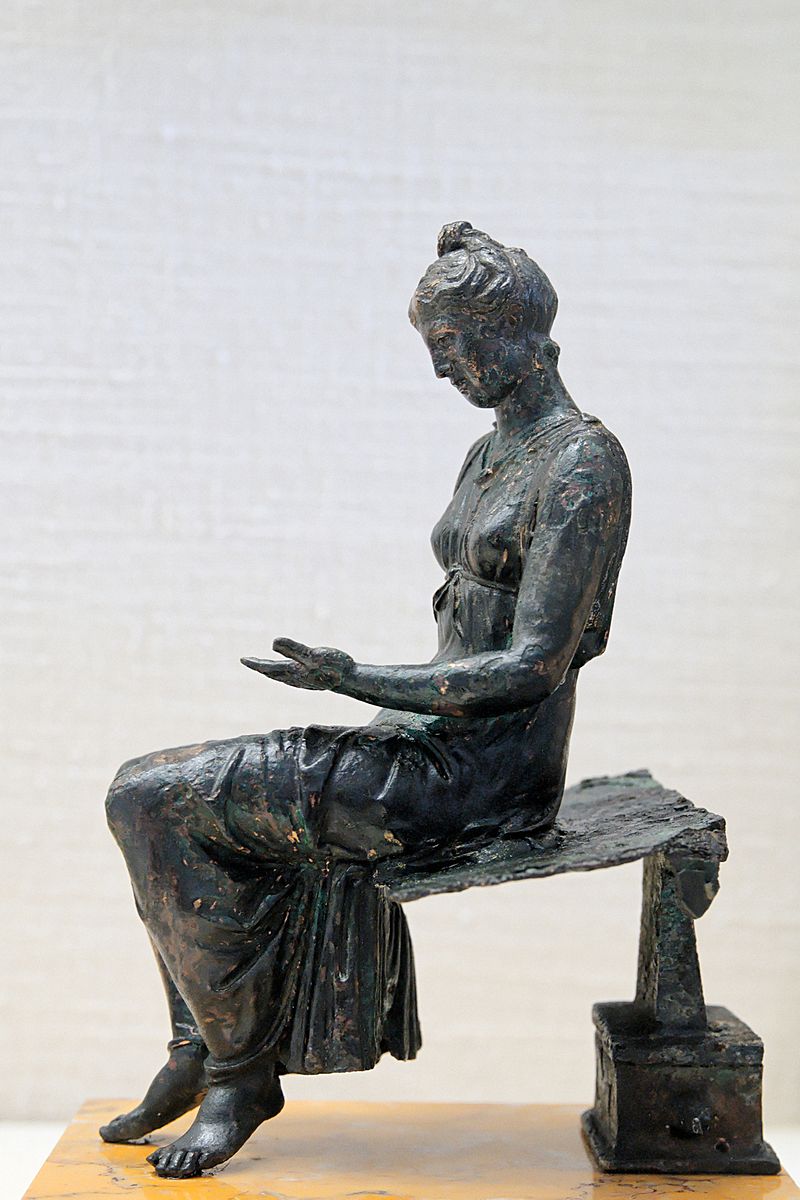Classics 301B
March 27, 2025

Examination #2: Tuesday, April 8 (Study Guide); Creative Project: due Tuesday, April 15

Roman animal mosaic (Antioch, Syria, ca. 400 CE)
Albius Tibullus (ca. 55–ca. 19 BCE): book 1 of Elegies published ca. 27-25 BCE; family estate perhaps confiscated by Octavian (41-40 BCE); briefly served in military with patron Marcus Valerius Messalla Corvinus (orator, politician & general, triumphed 27 BCE)
- virtually no mention of contemporary Augustan political world (escapist poetry); described by Horace as smart critic, handsome, philosophical, rich; blessed by gods with "art of enjoyment" (Epistles 1.4.7)
- Book 1 addressees: Delia (Plania?), boy Marathus as beloveds; cf. Delian Apollo (Diana/Artemis)
- Delia's status unclear: "your husband" (1.2.44); "But you must have initiative, and dare / To prowl around at midnight without fear" (1.2.23-4); rival lovers (1.5.47ff.)
- Tibullan lover: slave of love, soldier of love – his avocation vs. (real) war
Tibullan poetic tensions:
war vs. peace
simplicity vs. luxury/wealth
engagement vs. detachment
freedom vs. slavery
epic vs. elegy
death vs. life
fantasy vs. reality
city vs. country; stable domesticity vs. intense (elegiac) passion
.jpg)
Alberto Pisa, Ambarvalia sacrifice relief (1905)
- complex poetic setting: idyllic & Epicurean pastoral world intrudes, dream-like and nostalgic; imagines stable agricultural world of fertility & family – contradictions (elegy), some intrusions of Messala's ambitious & militaristic world (cf. Vergil's Eclogues)
- Tibullus 1.5: complaint – separation after tending to Delia's illness ("But everything I've done has been in vain; / Another tastes the fruits of all my pain", 17-18)
Tibullus 1.5.21-35 (how real(istic) are the poet's rustic fantasies?)
With Delia at my side, said I, I'll farm.
She'll oversee the threshing of the grain
In blazing noon, and watch the steady beat
As laborers tread the grapes with flashing feet.
She'll learn so much! to count the flocks; to play
Sweetly with the hired man's little boy;
And how to please the hungry gods as well,
offering corn, grapes, or a brimming bowl.
She shall be mistress of the whole domain. Let Messalla come;
Delia can pick the ripest fruit for him
And wait on him with her white hands, to show
How deep the veneration that's he's due.
Such were my dreams—mere figments, tempest-tossed
Now to remote Armenia—all lost.
remedies unsuccessful (wine, other women), impotence, curses Delia's "procuress"/witch (37-58); imagines richer rival(s) lurking, plea for poor man as faithful lover (59-66), "What am I singing for? The door stays shut" (67) – melancholy (urban) paraclausithyron of desperate lover with unrealistic dreams at door of inaccessible mistress

- Tibullus 1.1 (programmatic poem): rejection of wealth & war, prayers & wishes for simplicity & rustic life that includes Delia & passion transported to country
Tibullus 1.1ff.
Let someone else heap up a bulging pile
Of gold, and own vast acres of rich soil.
He toils away, forever on the watch
For enemies; sleep shuns his anxious couch.
Let peaceful poverty be my tranquil lot, [priamel]
The home-fires always glowing in the grate.
When planting season rolls around, I'd graft
Young vines; tend apples too with rustic craft.
Bountiful Hope would yield a bumper crop,
Filling each bin and wine jar to the top.
For lonely stumps can be my prayers' abode,
Or flower-decked stones that mark a triple road.
Whatever first-fruits harvest season yields,
I offer to the patron god of fields.
Ceres, let a crown of homegrown wheat
Hang up to decorate your temple gate.
And in the garden let Priapus stand, [rustic fertility god]
To frighten birds, his sickle in his hand.
Poverty-stricken gods of property
Once prosperous, Lares, take your gift from me:
Countless heifers once upon a time,
But the small plot now yields one meager lamb [land confiscations?]
To grace the feast at which the country boys
Pray for "Good crops! Good wine!" with joyful noise.
If only I could make my home right here, [real or imagined setting?]
And not keep moving on forevermore, [instability?]
I'd seek out shade, the Dog star rising high,
Under a tree, some burbling brook nearby.
I wouldn't be too proud to wield a spade
Or urge on lazy oxen with a goad;
Any abandoned kid or little lamb
Left by its mother I would carry home . . . [cf. Eclogues 1, Meliboeus]
. . . My father’s fortune, Grandfather’s rich crop,
Carefully garnered—these I can give up;
A humble income is enough for me,
And my own bed to sleep in peacefully.
Delicious, hearing the wild wind’s alarms
While cuddled up within my mistress’s arms,
And when harsh gales drench all the world in mire,
To sit and snooze in safety by the fire! [elegy?]
I ask no more; all riches cheerfully
I give to those who weather storms at sea.
Let all gold rot, and every emerald too,
Rather than one girl weep to see me go!
Messalla, you through land and sea must roam
To show your captured booty off at home;
While to a woman’s beauty captive here [servitium amoris]
Janitor-like I guard her stubborn door. [elegiac setting – paraclausithyron? urban reality?]
What I want, Delia, isn’t praise but you—
Let them call me sluggish, lazy too.
You I will gaze at in my dying hour,
You I will touch with my hand’s failing power.
And when upon the funeral pyre I lie,
your tears and kisses will gush for me. [cf. Propertius]
Yours is no brazen heart, but flesh—and sore;
Your tender bosom hides no flinty core.
From my funeral no one will go home
Dry-eyed, neither maiden nor young man. [readership]
But violence, Delia, wounds my ghost; so please
No hair-tearing, cheek-scratching—omit these.
All this will come. Turn now to love instead, [carpe diem]
Before dark Death sneaks up with muffled head
And feeble Age limps forward. It's not right
To say sweet nothings when your hair is white.
Grab hold of Venus!
Now's the time to break
Down doors, be riotous for love's sweet sake.
I am both general and private here. [militia amoris, paraclausithyron]
Let greedy men be wounded—I don't care—
And wealthy too. My livelihood's secure;
I can look down on both the rich and poor. [ideal philosopher-poet-lover?]

- Tibullus 1.2, paraclausithyron ("Please, door, open, just a crack for me, / But carefully—don't creak", 10-11); serenade/complaint describes secret affair ("You, Delia, must be bold and cunning too", 15) in city, has employed witch to beguile husband ("magic spells / Will seal his eyes", 44-5)
Tibullus 1.2.68-77 (contrast with husband, quasi-Epicurean fantasy of domestic bliss)
Iron-witted fool, who had you in his bed
But chose a military life instead!
Let him parade his troops of prisoners forth,
And pitch
his tent on bloody captured earth.
His armor's silver worked with gold, of course,
So let him preen in it astride his horse.
For myself, let me yoke
up my two
Oxen and plow, so long as I'm with you.
When we are entwined in one embrace,
Sweet sleep on the bare ground is no disgrace.
ending: fantasy explodes, still separated by door, threats "Whoever
finds this laughable—you'll see! / You too will suffer from Love's cruelty" (90-1), melancholic reverie


L: Young female reading (Pompeii, 1st century CE): R: Bronze statue of young female reading (1st century CE)
Sulpicia: (unmarried) daughter of Servius Sulpicius Rufus (orator, consul 51 BCE) & niece of patron Messalla; elite education as docta puella of Messalla's circle (including Tibullus, Ovid); 6 short elegies transmitted with manuscripts of Tibullus (book 3) – passionate desires, separation of lovers, fidelity, birthday, illness, etc.

Bee-bread
(pollen stored in honeycombs as food source)
- elegiacs: female voice/identity/subjectivity addressed to voiceless lover Cerinthus/Κήρινθος ("bee-bread/pollen ball"; poetry/bee-production)
- programmatic poem (3.13): self-awareness of status as female elegiac poet – tensions include silence vs. revelation, control vs. being controlled, obedience vs. defiance
Sulpicia 3.13 (programmatic poem) READER – Corina
At last a love has come of the sort that the scandal
of having concealed it would cause me more shame
than to reveal it to anyone.
Persuaded by my Muses, the Cytherean Goddess [poetry's power]
has brought him to me and placed him in my lap.
Venus has fulfilled her promises: let them tell of my delights—
whoever will be said to have enjoyed none of their own. [readership?]
I refuse to entrust a single thing to sealed
tablets so nobody can read it before my love.
It's a pleasure to have sinned. I'm sick of rearranging
my features for fame: they will say we were worthy of each other.
[defiance]
- birthday elegy (3.14): leaving Rome, separation, defiance of Uncle Messalla
Sulpicia 3.14 READER – Aaron
It's my birthday—horrible—because it must be spent
in the ghastly countryside, depressed, without Cerinthus. [lover first named]
What's sweeter than the city? Does a girl belong in a villa
near a freezing river flowing through the fields of Arezzo?
Now, Messalla, you are overly concerned about me. Acquiesce,
cruel
uncle—this is no time for a journey.
If abducted, I will leave my heart and soul right here,
although you have tried to deprive me of free will. [defiance]
*GROUPS*
Sulpicia's Songs (Noelle McMurty)



.jpg)




